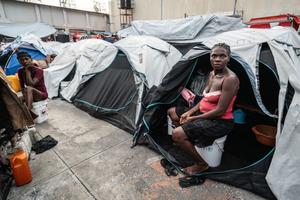Ransom Was Paid for Missionaries Kidnapped in Haiti
Two hostages were released on Nov. 21. An additional three hostages were released on Dec. 6. The remaining 12 hostages escaped from their captors in mid-December.

A ransom was paid for the missionaries held hostage in Haiti, said the husband and father of six of the now-released hostages.
“There had been a ransom agreement reached with the hostage takers,” said Ray Noecker, whose wife and five children were among the 17 people kidnapped by a Haitian gang on Oct. 16. Noecker was speaking at a Jan. 2 prayer luncheon held in thanksgiving for the release of his family.
“To my understanding, that ransom was actually delivered the Sunday night that my wife and son and other lady were released,” he said. “The ransom agreement was for the entire group, but there was some division within the gang, so they were not able to release all of them at that time.”
Noecker did not know who paid the ransom or how much was paid.
The ringleader of kidnapping and leader of the 400 Mawozo gang, Wilson Joseph, had initially threatened to kill the hostages unless he received his demands. The gang had sought a $1-million ransom for each hostage. It was not clear whether this ransom applied to the five children in the group, The Associated Press reported at the time.
Two hostages were released on Nov. 21. An additional three hostages, including Noecker’s wife and 6-year-old son, were released on Dec. 6. It was reported at the time that no ransom had been paid prior to the release of the first two missionaries.
The initial group of hostages ranged in age from 8 months to 48 years. Of the 17 hostages, 16 were American citizens, and one was Canadian. The group were all missionaries with Christian Aid Ministries, an Ohio-based Anabaptist organization.
At the time of the kidnapping, the missionaries were building an orphanage in Fond Parisien, Haiti. They were based in Titanyen.
The missionaries are from Amish, Mennonite and other Anabaptist communities in Wisconsin, Ohio, Michigan, Tennessee, Pennsylvania, Oregon and the Canadian province of Ontario.
While it was initially reported that the remaining 12 hostages were released by the gang, Christian Aid Ministries clarified in a press conference that the group had escaped while their captors were distracted.
“Over the time of their captivity, God gave various hostages a desire to attempt an escape, but it took them a while to all agree on when or how this should take place,” said a statement from Christian Aid Ministries spokesman Weston Showalter in a Dec. 20 press conference.
“To attempt such a thing would be dangerous! They sought God in prayer over and over again, seeking direction from him,” he said.
Showalter explained that the hostages prepared for their escape at night and had seized the opportunity to leave their locked house “when they sensed the timing was right.”
After escaping the camp, the group used moonlight, starlight and prayer to guide their way to safety.
“With God’s help, protection and leading, they quickly made their way through the night. They walked for possibly as much as 10 miles, traveling through woods and thickets, working through thorns and briars,” said Showalter.
“The moon provided light for their path. During times they weren’t sure which way to go, they stopped and prayed, asking God to show them,” he said.
In a statement published on Christian Aid Ministries’ website, the organization said they forgave the kidnappers.
“We do not know all of the challenges you face. We do believe that violence and oppression of others can never be justified. You caused our hostages and their families a lot of suffering,” it said.
“However, Jesus taught us by word and by his own example that the power of forgiving love is stronger than the hate of violent force. Therefore, we extend forgiveness to you. The hostages told you plainly how you can also be forgiven by God, if you repent. Our desire is that you and all who hear or read this statement may come to the saving knowledge of Jesus Christ, our Savior, the Son of God, and the Prince of Peace. Jesus died for all so that all can be saved.”
Haiti has become increasingly dangerous; in mid-November, the U.S. State Department ordered American citizens to leave the country.
“The Department of State urges U.S. citizens to make plans to depart Haiti now via commercial means. U.S. citizens should carefully consider the risks of traveling to or remaining in Haiti in light of the current security situation and infrastructure challenges,” said the State Department in a Nov. 10 release.
“Widespread fuel shortages may limit essential services in an emergency, including access to banks, money transfers, urgent medical care, internet and telecommunications, and public and private transportation options. The U.S. Embassy is unlikely to be able to assist U.S. citizens in Haiti with departure if commercial options become unavailable,” the department said.
The 400 Mawozo gang responsible for kidnapping the 17 missionaries is the same criminal gang behind the April 2021 kidnapping of Catholic priests and religious in Haiti.
- Keywords:
- haiti
- st junipero serra
















